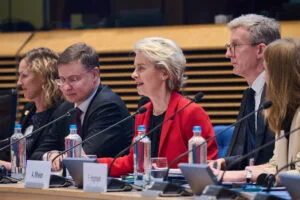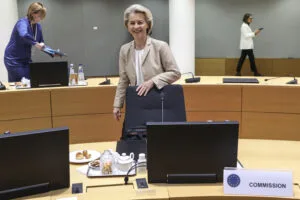Brussels – You can’t change a winning team—unless it is the European commissioners. After the European elections and the new balances between the parties that will form the new majority in the EU Parliament, the race has begun not only for Ursula von der Leyen to be reappointed as head of the Union’s executive but also for the 26 governments (Germany has reportedly already made its choice with the confirmation of the outgoing president) to choose their respective European commissioner candidates to be put forward for the future Commission presidency for final nomination and passage from the vote in the EU Parliament. And if von der Leyen is in pole position to succeed herself, the same cannot be said of the vast majority of the current members of the College of Commissioners, susceptible to changes in governments in member states from 2019 to the present and political balances now all to be built.

Opening the ball with an announcement that was as expected as it was predictable—but not so quickly—was the government of Latvia led by Evika Siliņa, which decided to reappoint its current member of the College of Commissioners in the von der Leyen cabinet for the next executive in Brussels as well. “The government has just supported the decision to promote Valdis Dombrovskis to the position of European Commissioner, an experienced candidate with extensive professional experience and opportunities to gain as much influence as possible in the European Commission.” said Latvian prime minister about the decision that came after the “overwhelming support from voters” for the EU Commission’s vice-president for the Economy, candidate of Latvian centre-right party New Unity (JV) in the European elections. “This corresponds to Latvia’s interests in strengthening its influence in the European Union,” pointed out Premier Siliņa, who in autumn 2023 has replaced at the helm of the Baltic country Krišjānis Kariņš, responsible for the first confirmation of Dombrovskis in 2019 after his experience in the Juncker Commission. “I will continue my work, strengthening the European economy and security, supporting Ukraine on its path to the EU and maintaining close ties with Latvia,” is the aknowledgement of the European commissioner candidate.
According to EU Treaties, European commissioners—one from each member country—are appointed by agreement between the EU Commission presidency and the member states, which propose them based on “general competence,” “European commitment,” and “guarantees of independence.” The Council of the European Union adopts the list, and each commissioner candidate must also pass a vote in the European Parliament. Therefore, it is clear that not only the political composition of the government that nominates its candidate should be considered, but also that of the majority that holds the Commission in the European Parliament. In other words, a government that is unbalanced to the right will not be able to overlook the fact that it will have to cash in on the approval of the centre-left as well: this is the case, for example, with Giorgia Meloni’s Italian government, which will have to look for a name that is also acceptable for the Democratic Party, which in the new legislature constitutes the largest delegation within the group of the Progressive Alliance of Socialists and Democrats (S&D).

In the 26 capitals, considerations have already begun on nominations for future European commissioners, although the timing will depend on the nomination of the European Commission presidency. Should it occur an acceleration on von der Leyen’s name as early as late June (at the European Council on 27–28) and mid-July (with confirmation at the plenary of the EU Parliament between 16 and 19), then an exchange can begin with the Berlaymont at the turn of the summer and confirmation hearings in Parliament between September and October (a couple of months ahead of the roadmap). In any case, there should be no significant surprises even if von der Leyen-bis fades, given that the Popular-Social Democrat-Liberal majority (with a possible entry of the Greens) is the only viable option in the European Parliament.
Of the 27 members of the current College of Commissioners, there are a few with the prospect of remaining at the Berlaymont for another five years. In addition to von der Leyen running for reappointment to the presidency and Latvian Dombrovskis reappointed from Riga, Slovak Maroš Šefčovič (Vice President for Interinstitutional Relations and the Green Deal) and Hungarian Olivér Várhelyi (Commissioner for Enlargement and Neighborhood Policy) have a very good chance. At the same time, the Czech Věra Jourová(Vice-President for Values and Transparency), the Bulgarian Iliana Ivanova (Commissioner for Innovation, Research, Culture, Education, and Youth) and the Cypriot Stella Kyriakides (Commissioner for Health and Food Safety) can still play their cards. The respective countries have not experienced any upheavals in the past five years (in Bulgaria, the political situation has been so uncertain for years that the presence of the centre-right Gerb in the government might be enough to confirm the appointment of the incoming commissioner only one year ago) and, in the absence of other political calculations, a stay in Brussels cannot be ruled out.

It’s a different story for those who have seen a passing of the baton between national political forces at the helm of their country, which cuts their possibility of reappointment at the root. Such is the case with Denmark’s Margrethe Vestager (Vice-President for Digital and Commissioner for Competition), Finland’s Jutta Urpilainen (Commissioner for International Partnerships), Luxembourg’s Nicolas Schmit (Commissioner for Labor and Social Rights, as well as Spitzenkandidat of the European Socialists at the Europeans), of Dutch Wopke Hoekstra (Commissioner for Climate Action), Polish Janusz Wojciechowski (Commissioner for Agriculture), Portuguese Elisa Ferreira (Commissioner for Cohesion and Reforms), Swedish Ylva Johansson (Commissioner for Home Affairs), and Italian Paolo Gentiloni (Commissioner for Economy).
Then there are the three commissioners expected to take office as MEPs after the successful outcome of the European elections, unless the respective governments indicate otherwise before the inaugural session of the EU Parliament on July 16: Croatia’s Dubravka Šuica (Vice-President for Democracy and Demography), Lithuania’s Virginijus Sinkevičius (Commissioner for Environment, Oceans, and Fisheries) and Romania’s Adina Vălean (Commissioner for Transport). On the other hand, Belgian Didier Reynders(Commissioner for Justice) is running is running for the post of secretary general of the Council of Europe and will require the outgoing government after the June 9 federal election to find a new candidate. The French name remains hung on the outcome of the June 30 (Thierry Breton was in pole position, but not if the government switches to the far-right Rassemblement National), while in Italy, the Meloni government would have several options on the table, among which the most credible could be that of the current Minister for European Affairs, Raffaele Fitto.
English version by the Translation Service of Withub









